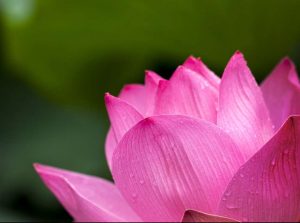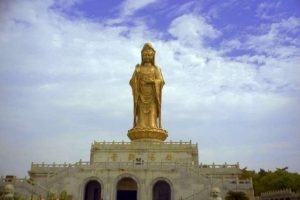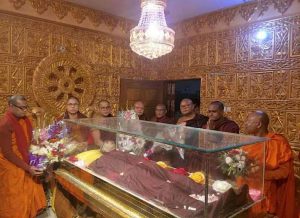Many advice manuals, often called “self-help books”, provide various tips on how to succeed in the modern world, how to live life to the full and how to find the happiness we all desire. A common topic expounded by most of these manuals concerns “self-confidence”, the perceived corner stone of any successful career in most industries. Much of the discussion on “self-confidence” centres on having faith in our identities, reasserting our sense of self and developing knowledge that “we” are capable and possess all the potential for success. Such practices explain self-confidence as if it was inseparable from a belief in distinct, rarefied selves and may seem incompatible with the Buddhist doctrine of non-self. From the outside, it would seem that Buddhism leaves its followers at a distinct disadvantage in a world that requires us to be assertive and self-assured.
This idea of self-confidence and self-assurance is often tied to a deeper practice of “finding oneself”. “Finding the self” has become the new goal of living. It is easily tied to a career that requires self-confidence and therefore this is a philosophy that can suit the demands of many a modern lifestyle. Due to our constant exposure to these ideas, it is quite common for people to assume that those who believe in Buddhism, in particular its doctrine of non-self, will be soft individuals, lacking the necessary self-confidence to face the challenges of a competitive world. Buddhist masters are often characterised as softly spoken sages, who do not follow their own desires but simply watch the world arise and fall away. I know that I certainly had misconceptions similar to these and in meditation sessions I would talk to my fellow practitioners in such a soft voice that it was difficult for anyone to hear me! It was a shock for me to go to Thailand and see much respected abbots barking orders at the younger monks! It seemed to contradict the soft Buddhism that I had expected to find.
I saw that these older monks were very clear and almost authoritative in their actions. I wondered how could their practice of seeing through the delusion of self lead to such confidence and assurance.
Within the confidence of some of these senior monks, it is possible to perceive a different approach to developing a comfort within ourselves; one that differs from the often advocated practice of reaffirming our self-worth. To explain how practicing non-self can lead to self-confidence I turn once again to the useful image of an archer and his target. The target can be considered as our sense of self or ego and the archer’s arrows represent the various sensual experiences we have in the world. When we have a large ego, a large target, it is easy for these experiences, or arrows, to hit us and to either cause pleasure or pain. With a large ego, when someone throws abuse at us it will certainly hurt. However, if we have small egos, small targets, such abuse will be less likely to hit “us” and therefore we will suffer less.
I interpret the self-confidence of the self-help gurus as a form of protecting the target, the ego, with various forms of armour to stop the arrows hitting. In building self-confidence, these manuals often recommend the practice of reaffirming to ourselves that we are capable individuals. In effect, this forms a kind of shield, behind which our egos can grow unaffected by the arrows of the world. However, maintaining that shield takes a lot of energy and may one day fail. Buddhist self-confidence on the other hand can be seen completely differently. When we see through the delusion of ego, our targets becomes extremely small and, for some individuals, completely non-existent. It becomes impossible to be hit by any arrows and therefore the practitioner does not fear pain or run after pleasure. I see this basis of fearlessness as allowing us to be confident and assured individuals. In a world without self-delusion, there is no longer any anxiety about failure or desire to hold on to success. We can strive for our goals with purpose, confidence and compassion without having to pretend we are someone else or to hold up a barrier to the world. When confidence has no self it can only expand and grow for the benefit of humanity.














